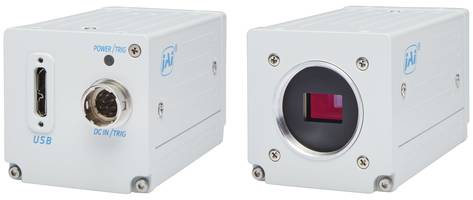New 3-CMOS Prism Color Cameras Feature Alumite-treated Lens Mounts
Press Release Summary:

- AP-3200T-USB-LSX and AP-1600T-USB-LSX features USB3 Vision interfaces
- AP-3200T-USB-NF-LSX and AP-1600T-USB-NF-LSX are configured without standard IR-cut filters for extended red-channel response
- Ideal for industrial applications including wafer inspection and metal inspection systems utilizing color to classify defects
Original Press Release:
JAI Adds 4 More Microscopy Cameras Offering Enhanced Suppression of Dust/FODs
San Jose, CA – July 23, 2019 – JAI today announced the availability of four new 3-CMOS prism color cameras designed for use in microscopy-based systems where maximum control of dust, lint, and other foreign object debris particles (FODs) in the optical path is critical.
The new Apex Series AP-3200T-USB-LSX is a 3.2-megapixel, 38.3 fps camera featuring three prism-mounted Sony IMX265 CMOS imagers. The AP-1600T-USB-LSX is a 1.6-megapixel camera with three IMX273 CMOS imagers and a full-resolution frame rate of 79 fps. Both models feature USB3 Vision interfaces, whose combination of bandwidth and easy plug-and-play compatibility have made it a widely-used choice for microscopy systems.
The two additional models (AP-3200T-USB-NF-LSX and AP-1600T-USB-NF-LSX) are configured without standard IR-cut filters for extended red-channel response. System builders can use these models to support life sciences applications where enhanced red sensitivity is required to accentuate specific dyes or stains or to differentiate blood or blood vessels from surrounding tissues. These models are also useful for certain food and industrial applications where both visible and NIR analyses are performed simultaneously.
While all of JAI’s microscopy cameras are carefully inspected to ensure exceptional image quality, the new “LSX” models undergo an even more rigorous screening process to ensure they meet even higher standards for dust/FOD suppression. This process is similar to the type of screening used by sensor manufacturers when classifying pixel defects. In addition, the LSX models come with special anti-static dust seals instead of traditional lens caps and feature alumite-treated lens mounts to minimize the creation of FODs when lenses are attached.
Like JAI’s previously announced microscopy cameras, the new models offer full integration with two of the most popular microscopy software solutions – Image-Pro® from Media Cybernetics and the µManager open source software package. Image-Pro is one of the most widely-used microscopy software packages in the world, enabling users and system designers to more easily capture, process, measure, analyze and share microscopy-based images. Custom drivers allow the Apex Series cameras to seamlessly pass images to the Image-Pro software while allowing certain camera functions to be controlled from within the Image-Pro environment.
For those who prefer an open source, non-commercial software solution, JAI’s Apex Series cameras have also been integrated with the µManager (Micro-Manager) software originally created by Vale Lab at the University of California in San Francisco and now being developed and maintained by Open Imaging, Inc. Again, device adapters have been developed to allow the JAI cameras to fully interact with the µManager software.
With their standard C-mount lens mounts, the Apex Series LSX cameras can be easily adapted to most brands of digital microscopes. The 3-CMOS prism technology provides much greater color differentiation than standard Bayer color cameras for brightfield or color fluorescence applications where subtle color differences are critical. The prism design also enables the use of color binning for increased sensitivity when needed, something that typical Bayer cameras do not support. Other unique features versus Bayer cameras include white balancing using shutter times rather than gain to keep image noise at an absolute minimum.
The cameras are designed for a wide range of life sciences applications where extreme color accuracy and spatial precision is required. They can also be used in various industrial applications including wafer inspection and metal inspection systems utilizing color to classify defects; materials science including food, composites, cosmetics, and many other materials; and manufacturing systems that perform particle analysis, spray/spot analysis, or inspection of fibers or other small details.
About JAI
JAI is a manufacturer of high quality, industrial-grade cameras for the machine vision, transportation, food & beverage, aerospace, medical and scientific markets.
JAI’s broad product line features high performance progressive scan CCD and CMOS cameras with spatial resolutions from VGA to 20 megapixels. It also includes a range of innovative multi-sensor prism-block cameras including both area scan and line scan models.
Physical interfaces include the Camera Link®, GigE Vision®, CoaXPress, and USB3 Vision high performance digital standards.
JAI cameras help improve customer businesses in a variety of ways, whether by improving quality and accuracy, lowering costs, increasing yields, or simply enabling better service. In addition to cameras, JAI’s traffic solutions group is one of the world’s leading manufacturers of specialized traffic systems. Solutions are based on JAI-developed hardware and software, which is often integrated with third-party products.
For more information, visit www.jai.com.
Contacts:
Americas
JAI Inc., San Jose, CA
Rich Dickerson
Phone: 408-383-4394
Europe, Middle East & Africa
JAI A/S, Copenhagen
Gregers Potts
Phone: +45 4457 8888
Asia Pacific
JAI Ltd., Yokohama
Azusa Kurata
Phone: +81 45 440 0154




